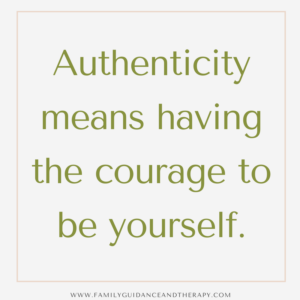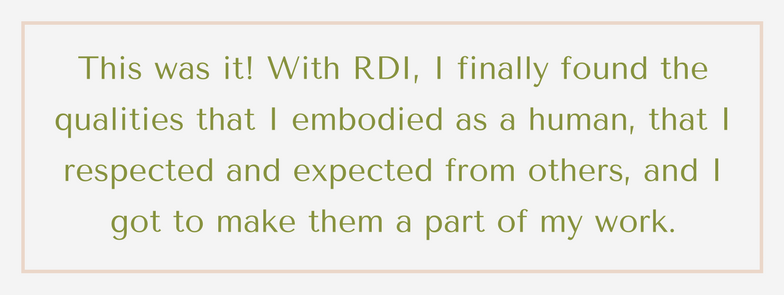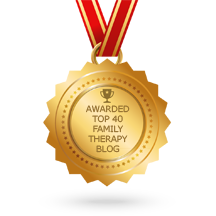What happens when your work values don’t match your personal values?
This year marks my 10 year anniversary working in the field of autism. I love my career, I love my company, I love my clients. And I love that I can say that whole heartedly and honestly now.Ten years ago, newly graduated from college, I was working in an extremely challenging residential school with young adults with autism, who were often self-injurious and aggressive toward others. I spent my days sitting at a small table “running drills” with the boys, handing them small bits of candy only when they got the answer correct. I was constantly giving them directions, telling them what to do, and rewarding them when they followed through. I followed behavior programs, put on jean jackets and arm protectors and was taught to focus solely on reducing the child’s behaviors.
It honestly hurts me to write all of this down and admit to the idea that I was not treating these children and young adults as humans.
They were seeing a behavior that had to be stopped.
When I moved to San Diego, I spent two more years continuing to make these mistakes. The hardest part for me to accept is that I was good at my job; I was always being told that my ability to stay calm and neutral when participating in a challenging restraint was admirable. I often came home bruised and exhausted, but I stopped the behavior! I was being told that this was the best way to work with a child with autism...and I excelled at it.
As I approached the end of my third year in the field of autism, I met a family who introduced me to RDI. I quickly observed how this mom was speaking to her daughter. She was not a child with autism, she was another human, she was her daughter. Go figure! She made sure her teachers at school spoke to her the same way. She showed me videos of how her RDI therapists worked with her. There were no drills, there were no constant directions and there was certainly no candy when she got the “right” answer. This mom and I developed a close relationship and she taught me the basic strategies of the RDI program. She used terms such as co-regulation, guided relationship and spotlighting, but all I kept coming back to was “humanistic.” With all of this new information, I spent the next several months implementing these strategies with the children I worked with. I started to look beyond the behavior and question why this behavior was occurring, rather than simply focusing on stopping it. I began to talk to these kids like they were kids! Although many of them could not verbally respond to me, I didn’t care, I talked to them like I spoke to my younger cousins: with compassion, empathy, silliness and honestly. I may not have received verbal affirmation from many of these students but I swear I could feel the difference. I was not putting as much pressure to get work done and instead, we would go for a walk during the day and simply chat about life. If they began to show a behavior when presented with a work task, I did not just jump into a behavior plan, I paused to consider why there was resistance.
As wonderful as this shift was becoming for me, it was not enough. I was starting to bring my true self into the room with a client, but I still had to follow the plans and rules of the company. I was at a crossroads. Do I stay with this stable, safe company and approach to autism? Or do I take a leap of faith, start a new job and learn more about RDI? Looking back on this time in my life, I am embarrassed to say that it was not as easy a decision as it should have been.
As I think back on my decision making process, the word that keeps coming up is authenticity. Who was I as a person?
I was raised to be compassionate, vulnerable, transparent, honest and live life with integrity. In my personal relationships these values came through. The most difficult realization I was beginning to make was that these values were not a part of my work. I was not demonstrating my true, authentic self. I worked with children for forty hours per week and I was being taught not to show compassion or empathy towards them! Once I made this discovery, how could I possibly even consider staying in my current position?
RDI allowed me to be my true self. I began working in home as an RDI extender who’s parents were working with certified RDI consultants. During my sessions we played games, went on walks, cooked together, did chores together and I was allowed to enjoy my time with them. When I was confused about why my client was responding in the way he or she was, I thought it out loud. Or when I felt genuinely frustrated that I could not help him or her in that moment, I told them that. I shared my own insecurities, fears and/or worries. In other words, I was becoming vulnerable. I was letting them know how much I appreciated them, respected their resilience and empathized when they were having a challenging day - I was showing compassion.
After a few years of working directly with a child as an RDI extender, I became a certified RDI consultant and began working with the parents. I immediately recognized that I was asking these parents to be their true, authentic selves. Not only with me, but with their children. This theme of authenticity was often one of the first few conversations I had, and still have, with new families.
Who are you as an individual? Who are you as a parent? Who do you want to be? What is stopping you from becoming this person?Together, we go through their personal journey of living life as their true authentic self, and it is an incredible journey, one that I feel privileged to be a part of.
This is my story of authenticity.
The lesson that I can take from it ten years later is:
- Don’t be afraid to be your authentic self - both in your personal life and your work life, especially when society, culture, rules or regulations tell you otherwise.
- It takes a whole lot of courage to stand up for what you believe in, but the outcome is far greater.
Ten years later, I am a confident, motivated and driven RDI consultant and Marriage and Family Therapy Intern that not only loves her job, but whole heartedly believes in what I am doing. As a wise beyond his years 16 year old client with Asperger’s once told me, “Authenticity means having the courage to be yourself.” I couldn’t agree more!


